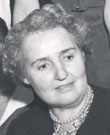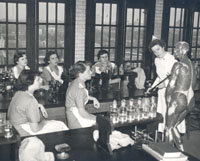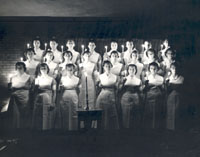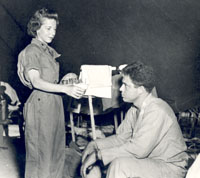In Her Words
“Radio Talk” by Louise Knapp, March 7, 1942
Louise Knapp, director of the Washington University School of Nursing from 1940 until 1961 gave this radio address on local St. Louis radio station KXOK on March 7, 1942. Though the United States had been at war for just 3 months, there was already a realization of the vital need for more nurses to meet the nation’s civilian and military demands. In this appeal for more nursing students, Knapp describes the training involved in becoming a nurse and the nursing school experience. She also describes the variety of available nursing careers and the satisfaction these careers may present to interested young women.
Our talk today will be of particular interest to young women who have brothers or friends in the Army. Along with every contingent of the Army goes a group of nurses. As the Army grows, the number of nurses must increase. Their places at home must be filled. Major General James C. Magee, Surgeon General of the United States Army, says, “The nation is girding itself for a prolonged and intensive struggle. Many young women who are planning on other careers would do well to weigh carefully the country’s need for nurses and give thought to the possibility of fulfilling this vital need by qualifying themselves as trained nurses.”
It takes time to make a graduate nurse – three years at least. Schools of Nursing accept high school graduates but applicants with college preparation are preferred. They should also be between 18 and 35 years of age. Today while students are learning in the hospitals, they are also giving necessary care to patients, and are helping to fill in some of the vacancies in the nursing group, created when graduates leave for Army service.
There are varied and interesting opportunities for college trained women who also have their professional nursing work. In a recent survey, it was shown that the first year after college graduation, those women in the nursing field had the highest median salary. While eight years later, nursing and teaching were the best paid professions for women.
In other words, a young woman who enters nursing today can expect economic security and independence. The day she completes her course, a nurse steps into a job. There are a number of positions which pay from $2,000 to $3,000 a year, and a few that pay over $5,000. These positions require experience in addition to the basic course. Quite aside from the pay the nurse receives, she has the satisfaction of realizing that her work is of great value to the community. Most of you know that nurses take care of sick people, but few may realize that the nurse also tries to keep people well, and to prevent the spread of disease.
If we had eyes like those referred to by Sam Weller in Dickens’ Pickwick Papers when he said: “If I had double-million magnifying eyes of h’extry power, I might be able to see through a deal door and up a flight of stairs,” we might be able to watch some of the nurses at their daily work. A hasty glance inside the walls of any hospital would show us a patient being prepared for an operation, while in the operating room the “scrub nurse” and the circulating nurse go swiftly and smoothly about their tasks. The scrub nurse, in her sterile gown and gloves, is ready to hand gauze sponges or sutures to the surgeon, just a split second before he has to ask for them. The circulating nurse replenishes supplies and is ready to get additional equipment as needed. There is a real thrill in working as a member of such a “team” for each individual has his own part to play.
Looking further through the hospital, we would find a patient propped in bed quietly eating his supper. To you he may seem just an ordinary person, but to the nurses he represents another dramatic episode – only ten days ago he entered the hospital acutely ill with pneumonia. For days, under medical supervision, the new drugs were used, skillful nursing care was given, and today, the nurses are proud of their share in his recovery.
Nursing service to not confined to the hospitals. Many nurses are employed in industrial plants. Today, as the factories speed up production, more workers are needed, and every worker must be kept on the job. Nurses give first aid for minor injuries, so the worker can return to his machine. They also carry out the doctor’s orders in advising the employees about health problems. Headaches, frequent colds, backaches and indigestion are responsible for many days absence from work. Yet, after the doctor’s examination, often a simple adjustment in the day’s routine or the use of spectacles will solve the problem.
Nurses go wherever there is a need, and many are working in small towns and rural districts. We still need many more, if all people are to get adequate care. Since homes are scattered over a large rural district, and nurses are few, the rural nurse accomplishes most by giving advisory service, and by teaching mothers to take care of the health of their own families. The rural nurse works with school teachers and home demonstration agents, to help them understand health needs and to interpret health services to others. The nurse teaches classes in home nursing, gives demonstrations of the care of the mother during pregnancy, and the equipment needed for a home delivery. She shows mothers and high school girls how to bathe the baby, and give him adequate care.
And, in whatever field you find nurses engaged, there are positions on various levels. The staff nurse in the hospital has her work directed by a head nurse; the head nurse receives help from the supervisor; while the supervisor refers her problems to the director of nurses. Nurse instructors are needed to teach students and staff nurses.
With the increased need for nurses in all these fields – military, institutional, private duty, public health, we must make every effort to increase the enrollment in Schools of Nursing. Fifty thousand students are needed this year for schools of nursing. The need will probably increase in the near future for we cannot begin to meet present demands.
Nurses carry responsibility for many different activities. The nurse must be skillful in the use of her hands. She needs a warm and sympathetic understanding of people. She must have a good intelligence, with a sound academic background and a reasonable amount of curiosity, if she is to keep up-to-date in her professional field. Every new development in medical science, or nutrition, or education, means adjustment and changes in the work delegated to the nurse. She must also possess good health, for the work itself is taxing and means long hours of standing. It is because we realize more clearly than ever the achievements that have been made in nursing by women who possess the characteristics just listed, that we appeal to young women to enter the profession at this time. The need for nursing service is great and the satisfaction gained by those who render such service will be in proportion to the need.
The steps in becoming a nurse are:
1. Get catalogs from two or three Schools of Nursing and compare what they have to offer. If you have had, or plan to take, college work, you may be particularly interested in the combined college and hospital work, leading towards the degree – Bachelor of Science in Nursing, as well as the diploma. Washington University and St. Louis University are two places offering such a course.
When you apply for admission to the School, you will find that many schools give tests to determine the applicant’s adaptability for nursing. These tests are helpful to the School, and often prevent subsequent discouragement on the student’s part if she had been allowed to enter without the necessary qualifications.
2. Upon successful completion of the School of Nursing program, the diploma in nursing is awarded.
3. The nurse then takes State Board Examinations covering the subjects completed in the School of Nursing and given to all graduates in the state. When she passes these examinations, she is granted a license to practice as a Registered Nurse, and may write after her name R.N.
The cost of preparing for a career in nursing is slight compared with preparation for other fields. Today the better schools will charge tuition. The student will also be expected to pay for her uniforms, books, and certain other fees. The total amount for the three years will vary from approximately $100 to about $600. Information on this point can be secured from the individual schools.
For those who wish to use their abilities to the utmost, nursing is the ideal field. Successful nurses represent many different characteristics, and these characteristics in various combinations and degrees. At one extreme we find some nurses who lean toward the scientific field, and find their greatest happiness in teaching courses in physiology or bacteriology to students in a School of Nursing. At the other extreme, there are nurses who enjoy private duty because with only one patient to care for, detailed care can be given, and since many hours are spent with the patient, his less tangible problems are gradually revealed. The nurse can often, just by listening, give a patient a chance to discuss his worries. When these are brought into the open, they may seem less fearful, and the patient so relieved, is more apt to make a speedy recovery. Nursing care is not limited to baths and bed making, but includes an understanding of the patient as an individual, and an ability on the nurse’s part to give help in both physical and mental problems.
In between these two extremes of teaching and private duty, there are so many different kinds of nursing that an individual can usually find just the position which fits her own interests and abilities.
What can a young woman expect if she enters a School of Nursing? Is it a cloistered existence, or how does life there compare with that in a college? Today, with a careful selection of students, students generally find congenial friends in the School, whose interests coincide with their own. The first six months of the three-year course is spent chiefly in the class-room, with a few hours each week spent in the wards, where the student carries out the procedures learned in the class-room, and adapts these procedures to individual patients. After the first six months, or pre-clinical period, the student receives her cap, is accepted as a regular member of the School, and is assigned to the ward services in rotation. She spends the required amount of time in the medical wards, surgical wards, operating room, diet kitchen, maternity ward, and children’s wards. In addition, some schools of nursing provide experience in the Out-Patient Department, in the care of mental patients, and in a public health agency, such as the Visiting Nurse Association or Health Department. When the student has completed all services, she has a good idea of the field of nursing which interests her the most, and for which she can qualify.
All through the course in the School of Nursing, the student has a chance to broaden her interests and to find new ones. The Student Association plans a social program which includes, for example, in our own School, such activities as formal and informal dances, weekly teas, hikes and “wiener roasts,” skating parties, basketball, and a devotional hour.
In addition, through the assistance of competent instructors, who volunteered their services, we have given classes in ballroom dancing, bridge, singing, and design for dressing. Many students have acquired skill and self-confidence through these extra-curricular activities.
In closing, let me repeat, nurses are needed. Schools can accommodate 50,000 new students this year. Young women with college preparation will find the opportunities in nursing challenging, and worthwhile. Nursing is an excellent field for patriotic service.
Nursing service brings rich returns to the individual in the profession, in the form of personal satisfaction, interesting working conditions and contacts, and adequate compensation.
The knowledge and skills acquired in nursing are invaluable for those members of the profession who become wives and mothers.
The importance of nursing at this time has been well explained in the following quotation from Dr. Thomas Parran, Surgeon General of the United States Public Health Service, “The nursing profession challenges the thoughtful consideration of mature, well qualified high school and college graduates. If we are to emerge victorious in this titanic fight for freedom, thousands of additional young women must be enrolled in the nursing profession as the watch guards of the nation’s health. Not all who apply will be admitted, because nursing as we know it today is an exacting, scientific skill that requires the finest talents which women possess. For those who qualify – and there will be many – nursing offers more security and wider opportunities for service than any other occupation open to women. It is important to remember that the need for well trained nurses will not end with the present emergency.”
So if you are ready to take part in this essential service to your country, both for war and peace, get information from the School of Nursing of your choice and qualify to start on this career.
Related Links:
Return to Speeches, Essays & Narratives (In Her Words)
Return to In Her Words
Back to Top




